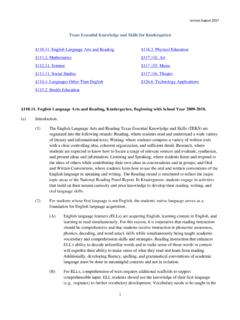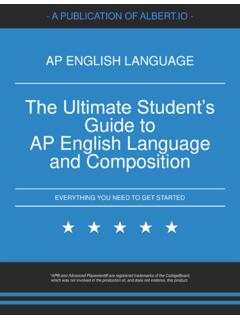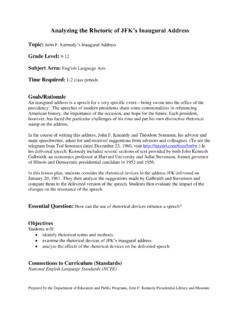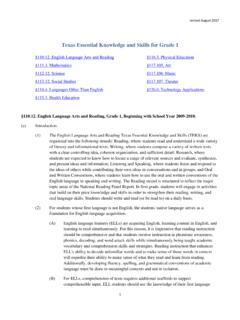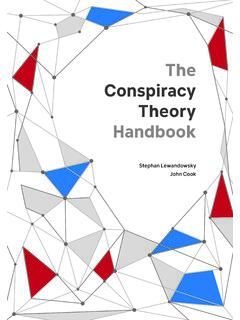Transcription of Glossary of Dramatic Terms - Oranim
1 Glossary of Dramatic Terms Note: The Glossary is in alphabetical order. The Terms have been collected and adapted from various sources, listed at the end of this document. Act: A major division in a play. An act can be sub-divided into scenes. (See scene). Greek plays were not divided into acts. The five act structure was originally introduced in Roman times and became the convention in Shakespeare s period. In the 19th century this was reduced to four acts and 20th century drama tends to favor three acts. Antagonist: A character or force against which another character struggles. Examples: Creon is Antigone's antagonist in Sophocles' play Antigone; Tiresias is the antagonist of Oedipus in Sophocles' Oedipus the King.
2 Apron: The part of a proscenium stage that sticks out into the audience in front of the proscenium arch. Aside: Words spoken by an actor directly to the audience, but not "heard" by the other characters on stage during a play. Example: In Shakespeare's Othello, Iago voices his inner thoughts a number of times as "asides" for the audience. Blocking: Movement patterns of actors on the stage. Planned by the director to create meaningful stage pictures. Box set: A set built behind a proscenium arch to represent three walls of a room. The absent fourth wall on the proscenium line allows spectators to witness the domestic scene.
3 First used in the early nineteenth century. Catharsis: The purging of the feelings of pity and fear. According to Aristotle the audience should experiences catharsis at the end of a tragedy. Character: An imaginary person that inhabits a literary work. Dramatic characters may be major or minor, static (unchanging) or dynamic (capable of change). Example: In Shakespeare's Othello, Desdemona is a major character, but one who is static. Othello is a major character who is dynamic, exhibiting an ability to change. Chorus: A traditional chorus in Greek tragedy is a group of characters who comment on the action of a play without participating in it.
4 A modern chorus (any time after the Greek period) serves a similar function but has taken a different form; it consists of a character/narrator coming on stage and giving a prologue or explicit background information or themes. Example 1: Traditional Chorus The majority of Sophocles' plays. Example 2: Modern Chorus The Prologue in Shakespeare s Romeo and Juliet, which gives the background to the action. The protagonist in Tennessee Williams' The Glass Menagerie, who introduces the themes of the play. Climax: The turning point of the action in the plot of a play and the point of greatest tension in the work. (See Appendix 1: Freytag s Pyramid) Example: The final duel between Laertes and Hamlet in Shakespeare s Hamlet.
5 Comedy: A Dramatic work in which the central motif is the triumph over adverse circumstance, resulting in a successful or happy conclusion. ( ). Comedy can be divided into visual comedy or verbal comedy. Within these 2 divisions there are further sub- Glossary of Dramatic Terms 2 divisions. For example visual comedy includes farce and slapstick. Verbal Comedy includes satire, black comedy and comedy of manners. Comic Relief: Comic relief does not relate to the genre of comedy. Comic relief serves a specific purpose: it gives the spectator a moment of relief with a light-hearted scene, after a succession of intensely tragic Dramatic moments.
6 Typically these scenes parallel the tragic action that they interrupt. Comic relief is lacking in Greek tragedy, but occurs regularly in Shakespeare's tragedies. Example: The opening scene of Act V of Hamlet, in which a gravedigger banters with Hamlet. Conflict: There is no drama without conflict. The conflict between opposing forces in a play can be external (between characters) or internal (within a character) and is usually resolved by the end of the play. Example: Lady Gregory's one-act play The Rising of the Moon exemplifies both types of conflict as the Policeman wrestles with his conscience in an inner conflict and confronts an antagonist in the person of the ballad singer.
7 Complication: An intensification of the conflict in a play Convention: Literary conventions are defining features or common agreement upon strategies and/or attributes of a particular literary genre. Examples: The use of a chorus was a convention in Greek tragedy. Soliloquies, (which are not realistic) are accepted as part of the Dramatic convention. Denouement / Resolution: Literally the action of untying. A denouement (or resolution) is the final outcome of the main complication in a play. Usually the denouement occurs AFTER the climax (the turning point or "crisis"). It is sometimes referred to as the explanation or outcome of a drama that reveals all the secrets and misunderstandings connected to the plot.
8 (See Appendix 1: Freytag s Pyramid) Example: In Shakespeare s Othello, the climax occurs when Othello kills his wife. The denouement occurs when Emilia, proves to Othello that his wife was in fact honest, true, and faithful to him. Deus Ex Machina: When an external source resolves the entanglements of a play by supernatural intervention. The Latin phrase means, literally, "a god from the machine." The phrase refers to the use of artificial means to resolve the plot of a play. Examples: Many of Euripides plays have gods coming to rescue the day. In Medea a dragon-drawn chariot is sent by Apollo, the Sun-God, to rescue Medea who has just murdered her children.
9 In Joe Orton s classic play, What the Butler Saw (1969) the deus ex machina comes in the form not of a god but of a policeman who saves the day. Dialogue: The conversation of characters in a literary work. In plays, characters' speech is preceded by their names. (See Appendix 2 for discussion on what is dialogue in Dramatic Terms .) Diction: According to the Cambridge Dictionary, diction is the manner in which words are pronounced. Diction, however, is more than that: it is a style of speaking. In drama diction can (1) reveal character, (2) imply attitudes, (3) convey action, (4) identify themes, and (5) suggest values.
10 We can speak of the diction particular to a character. Example: Iago's and Desdemona's very different ways of speaking in Othello. Dramatic Irony: A device in which a character holds a position or has an expectation reversed or fulfilled in a way that the character did not expect but that the audience or readers have Glossary of Dramatic Terms 3 anticipated because their knowledge of events or individuals is more complete than the character s. Example: In Shakespeare s Othello Othello blames Desdemona for cheating on him. The audience knows that she is faithful and Iago deceives him. Dynamic Character: Undergoes an important change in the course of the play- not changes in circumstances, but changes in some sense within the character in question -- changes in insight or understanding or changes in commitment, or values.


